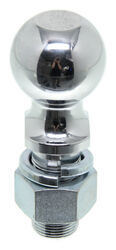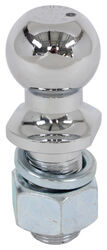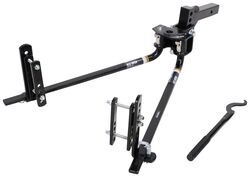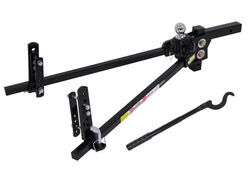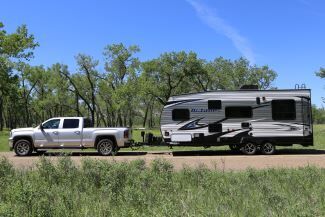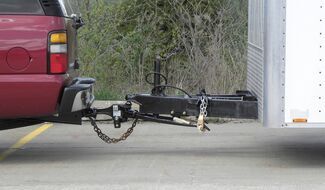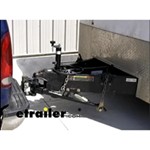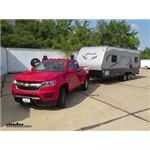
Determining Campers Tongue Weight To Choose a Weight Distribution System
Question:
I contacted Camco the manufacturer of EAZ Lift. The tech support scolded me for using this formula of adding pounds to the cargo and tongue. He said WD hitch ratings are determined by 10 of the GVWR. Not adding pounds here’s and there. I was going to go out and buy 1000 lb bars to upgrade my 800lb EAZ lift kit after reading this thread. My trailer is a Jayco gvwr @ 6800 dry hitch @555. The tech assuredly me my set up was fine. Please clarify thank you.
asked by: Ralph
Expert Reply:
First of all, the fact that they scolded you would tend to put me off. It sounds like they passed on a teaching opportunity. Our philosophy is to educate without judgement.
The article you read, "2 STEPS FOR FINDING THE RIGHT WEIGHT DISTRIBUTION HITCH SIZE" is based on the sum of our knowledge on that particular topic gained from leaders in the industry like Reese, Curt, Equal-I-zer and Fastway. These companies have been selling weight distribution for years upon years, and we trust their input well enough that we're willing to pass it along to our customers.
The best way to determine the tongue weight of a trailer (and the way we recommend) is to measure it, and add in the weight of anything stowed in the tow vehicle behind the rear axle. A tongue weight scale like the etrailer , part # e99044 would be the easiest way, but there are certainly others mentioned in the article I've linked for you.
If it's not practical to use any of these methods, you can determine the range that the tongue weight might fall into by making an educated guess. Your lowest possible tongue weight would be 10 percent of the dry trailer weight. The maximum would be 15% of the GVWR, assuming that the trailer is loaded to the max. Somewhere in between those two figures is where the actual fully loaded and ready to tow tongue weight would fall (don't forget the weight of cargo behind the tow vehicle rear axle). You'd then need a system whose effective weight range encompasses that range. If you know that your camper has empty water tanks when you tow, and you don't carry a lot of heavy gear, then you know you'll be toward the lower end of that spectrum.
Let's take your camper, for instance. The tongue weight will very likely be somewhere in between 555 lbs and 1020 lbs, not including what's carried behind the axle of the tow vehicle. We know that it's not very likely that you'll tow a completely empty camper unless you're taking it on its maiden voyage home from the dealer. It's also unlikely that you'll tow that camper jam packed all the way up to its GVWR.
Given all that (and if you're still awake after that explanation), the 1000 lb bars would very likely work perfectly for you, and would be effective on a trailer with tongue weights ranging from about 600-700 lbs up to 1000 lbs. This being said, the best option is to load up like you normally would and get a definitive tongue weight figure.
Because campers are easily affected by crosswinds and turbulence from passing or oncoming traffic, I would urge you to use a system that has an integrated sway control component. The Fastway e2, part
# FA94-00-1000 is what I'd recommend for a camper like yours. It's effective on campers with 600-1000 lbs of tongue weight and works great for campers with mild to moderate sway. The system includes everything needed except for the trailer ball. For a 2-5/16 inch ball, # 19286 is recommended or # A-90 for a 2 inch ball.
For moderate to severe sway, the Equal-i-zer # EQ37100ET you'd looked at would be perfect.

Products Referenced in This Question
2-5/16" Hitch Ball - 1-1/4" Diameter x 2-3/4" Long Shank - Chrome - 12,000 lbs
- Trailer Hitch Ball
- Trailer Hitch Ball
- Standard Ball
- Chrome-Plated Steel
- 2-5/16 Inch Diameter Ball
- 2-3/4 Inch Shank Length
- 1-1/4 Inch Diameter Shank
- 12000 lbs GTW
- Class IV
- Class V
- Draw-Tite
more information >
2" Hitch Ball - 1-1/4" Diameter x 2-5/8" Long Shank - Chrome - 10,000
- Trailer Hitch Ball
- Trailer Hitch Ball
- Standard Ball
- Chrome-Plated Steel
- 2 Inch Diameter Ball
- 2-5/8 Inch Shank Length
- 1-1/4 Inch Diameter Shank
- 10000 lbs GTW
- Class IV
- Class V
- CURT
more information >
Fastway e2 Weight Distribution w/ 2-Point Sway Control - Round - 10,000 lbs GTW, 1,000 lbs TW
- Weight Distribution Hitch
- WD With Sway Control
- Some Sway
- Includes Shank
- Electric Brake Compatible
- Surge Brake Compatible
- Fits 2 Inch Hitch
- Allows Backing Up
- 700 lbs
- 800 lbs
- 900 lbs
- Fastway
more information >
Product Page this Question was Asked From
Equal-i-zer Weight Distribution System w/ 4-Point Sway Control - 10,000 lbs GTW, 1,000 lbs TW
- Weight Distribution Hitch
- WD With Sway Control
- Some Sway
- Includes Shank
- Electric Brake Compatible
- Surge Brake Compatible
- Fits 2 Inch Hitch
- Allows Backing Up
- 800 lbs
- 900 lbs
- Equal-i-zer
more information >
Featured Help Information
Instructions
Miscellaneous Media

Continue Researching
- Article: 5 Things to Know About Weight Distribution Hitches
- Article: 2 Steps for Finding the Right Weight Distribution Hitch Size
- Article: Determining Trailer Tongue Weight
- Q&A: Is There an Axle Flip Kit For The 2023 Northern Spirit 2145RBX Travel Trailer?
- Article: Which Sway Control Hitch is Right For Your Trailer?
- Article: How to Measure for Trailer Hitch Drop
- Q&A: Does the B&W Continuum Work w/ Trailers that Have 4 Inch Tall Frames?
- Article: 5 Tips to Confidently Choose Your Weight Distribution Hitch
- Q&A: Best Way to Prevent Sagging Suspension When Towing a Trailer
- Q&A: Difference Between 2-Point and 4-Point Sway Control on Weight Distribution Systems
- Article: Wiring Trailer Lights with a 7-Way Plug (It's Easier Than You Think)
- Q&A: Recommended Equal-i-zer Hitch For A 2024 Jayco Flight 225MLS And Instruction Manual
- Q&A: Will B&W Continuum Weight Distribution System Work with Center Frame Piece on Trailer Tongue
- Q&A: B&W Continuum Weight Distribution System Installation - Do Truck And Trailer Need To Be Level?



